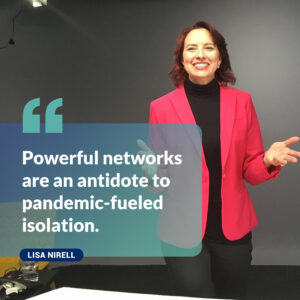Isolation is probably one of the worst pandemic aftershocks we’re witnessing.
I monitor my own sense of isolation as carefully as I monitor my information intake, social circles, sleep habits, and diet. Living solo, I make it a daily priority to visit my local coffee shop, attend regular swim team practices, and call my dear friends. More than ever, it is imperative to build meaningful networks. These support structures help us to become a better version of ourselves.
In the latest Mindful Marketer episode, creative entrepreneur, speaker, and author Bruce Turkel and I share the secrets of magnifying your personal power, the importance of connecting in a safe environment, and the miracles that happen when strong professionals come together.
Here are some key points we covered:
✔️ You need to rethink the “WHAT’S IN IT FOR ME?” mindset. Finding the best network first starts with asking, “Where can I be most helpful?” and “How can I be of value?” Intimate interactions are born by giving before receiving.
You’d be surprised what comments I hear while recruiting new members for The Marketing Growth Leaders™ private peer community. I will periodically meet a CMO who exhibits an attitude that just doesn’t align with ours. I’ll always remember the East Coast tech CMO who said “I will only attend peer group meetings where I’m the guest or keynote speaker.” (You cannot make this up).
✔️ Look for four attributes in the peer group: Contacts, Skill Sets, Experiences and Talents. If people share these with you and you, in return, share these with others, your personal power magnifies exponentially.
✔️Be willing to ask. Be willing to let people know what it is you do, and what you need. It is okay to be vulnerable. You will build more trust that way!
Furthermore, when you face the opportunity to help others address some challenging business or personal issues, be willing to roll up your sleeves and help. In our peer groups, we pair up members who face, or have faced, similar marketing strategy, leadership, or career challenges.
✔️ Embrace compassionate group conflict. Your group leader needs to demonstrate a history of guiding these tough conversations. Member conflict has happened a few times in my peer groups—often offline—and made the member connections stronger. It also weeded out two members who preferred to handle conflict by hiding. Again, an unwillingness to be real hinders trust and promotes superficial social networking.
✔️ “Thank you” is the currency of an organization. Bruce has a ritual that keeps groups engaged and purposeful. By saying “thank you” at the end of a meeting, members are acknowledged for providing the most help to others, and the practice establishes a giving culture.
One of the qualities of a powerful leader is the ability to show benevolence to others. Peer groups set the stage for that power to express itself. Posting complaints on Twitter and Facebook, postponing difficult (live) conversations, or silently monitoring a Slack channel are not viable alternatives.
